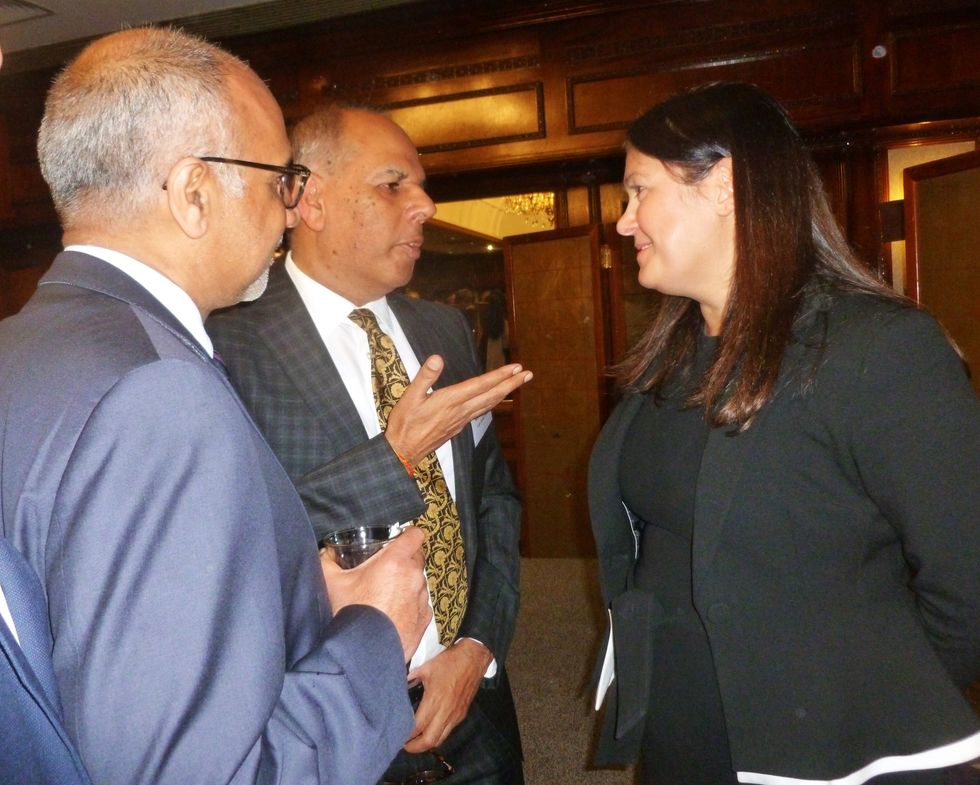Mobilising Hindu-Americans is crucial for president Joe Biden's potential re-election next year, suggests prominent Indian-American fundraiser for the Democratic Party.
This emphasis comes in light of the administration facing discontent from Muslim-Americans amid the Israel-Hamas conflict.
Ramesh Kapur, a Massachusetts-based political fundraiser who was in Washington to attend the winter retreat of the Democratic National Committee (DNC), said Hindu-Americans and Indian-Americans have traditionally been overwhelming Democratic supporters, but in the last few election cycles, the Republican share in their vote banks has seen an upward trajectory.
Kapur, who was also invited to the Holiday Party by president Biden at the White House, said that he has submitted a detailed report to the DNC and party leaders as to why Hindu votes have become "very critical" for Biden's re-election campaign ahead of the 2024 general elections.
Kapur, who claims that he helped convince California governor Gavin Newsom to veto a bill outlawing caste discrimination in October, said he has submitted a fact-based report and made a set of recommendations to the top leadership of the party and the campaign.
"I've been trying to get the Hindus to support the Biden administration. Of course, 72 per cent of the Indian-Americans voted last time for Biden. We want to make sure that the Hindu-Americans are going to be mobilised," Kapur said.
"We have a little uphill battle because the perception out there is that the Democratic party is anti-Hindus. I've talked to the White House. I've talked to the campaign to change that perception that is out there. That's what I'm trying to do. I'm working with our campaign to make sure that we change that perception that's out there,” Kapur said in an interview.
Kapur also said he did a survey from the census and got State by State, Muslim, and Hindu votes. "Compared them next to each other to make it easy for the campaign to understand. In the battleground States, we (Hindus) are not as less than the Muslim votes," he said.
Axios in a recent report identified four battleground states - Wisconsin, Georgia, Pennsylvania, and Arizona.
A battleground state is one in which the Democratic and Republican candidates both have a good chance of winning and that is considered key to the outcome of a presidential election.
Many consider Virginia, Michigan and Florida also playing in deciding the fate of the 2024 elections. In his report, Kapur says that in Georgia there are 172,000 Hindus as compared to 123,000 Muslims.
Similarly, in Pennsylvania, there are about 130,000 Hindus compared to 150,000 Muslims. In Arizona, there are about 74,000 Hindus and about 110,000 Muslims. In Wisconsin, there are 38,400 Hindus and 68,000 Muslims. In Virginia, there are about 200,000 Hindus and about 170,000 Muslims.
In Massachusetts, there are 75,000 Hindus as against 131,000 Muslims, while in Florida, there are 202,000 Hindus and 127,172 Muslims.
In its eight years, Kapur says, the Obama administration, "catered" to the Muslims "at the expense of" the Hindus. "Now that the Muslims are upset because of what is happening in the Middle East and they feel that the Jewish community... and Israel is given more, they (Biden administration) are taking more of their side than Palestine and the Arabs in that area," he said.
The anger of the Muslim Americans was evident during the DNC's winter retreat held in Washington DC last week, where only one of the major fundraisers from their community showed up.
"Instead of understanding the reality of what politics is, they're getting carried away. They're upset more because they think they have more clout by the numbers that they have reflected. That's sitting it down, sitting in the campaign,” he said.
Kapur said he has recommended multiple things to the campaign including visits to the Hindu temples in key battleground states like Georgia and Virginia to change the perceived anti-Hindu image of the party.
The party, he said, has agreed to invite a Hindu priest to the Democratic Party Convention in Chicago next year, which would nominate its candidate for the November 2024 presidential elections.
"I'm going to recommend to the president that he's got to first of all meet some of the Hindu leaders in the White House. He has met the Jewish leadership, and he met the Muslim leaders. He should also meet the Hindu leadership," Kapur said.
He said he would also ask vice president Kamala Harris, whose mother (Shyamala Gopalan) was a Hindu, to go to the battleground states and visit some temples there.
"The Republican Party (leadership) is doing that. (Donald) Trump's daughter-in-law went to the Rajdhani Temple (in Virginia). Governor Glenn Youngkin went to the Rajdhani Temple. That helped him get elected as the governor,” he said.
(PTI)






 Atif Aslam’s Instagram, known for Bollywood hits like ‘Tere Sang Yaara,’ now inaccessible to Indian fansInstagram Screengrab
Atif Aslam’s Instagram, known for Bollywood hits like ‘Tere Sang Yaara,’ now inaccessible to Indian fansInstagram Screengrab  Fawad Khan’s Instagram displays ‘Account not available in India’ Instagram Screengrab
Fawad Khan’s Instagram displays ‘Account not available in India’ Instagram Screengrab  Rahat Fateh Ali Khan’s iconic Sufi music vanishes from Indian Instagram feeds post-restrictionInstagram Screengrab
Rahat Fateh Ali Khan’s iconic Sufi music vanishes from Indian Instagram feeds post-restrictionInstagram Screengrab











 The culture secretary with Shailesh Solanki and Kalpesh Solanki from the Asian Media Group (AMG), publishers of Eastern Eye
The culture secretary with Shailesh Solanki and Kalpesh Solanki from the Asian Media Group (AMG), publishers of Eastern Eye